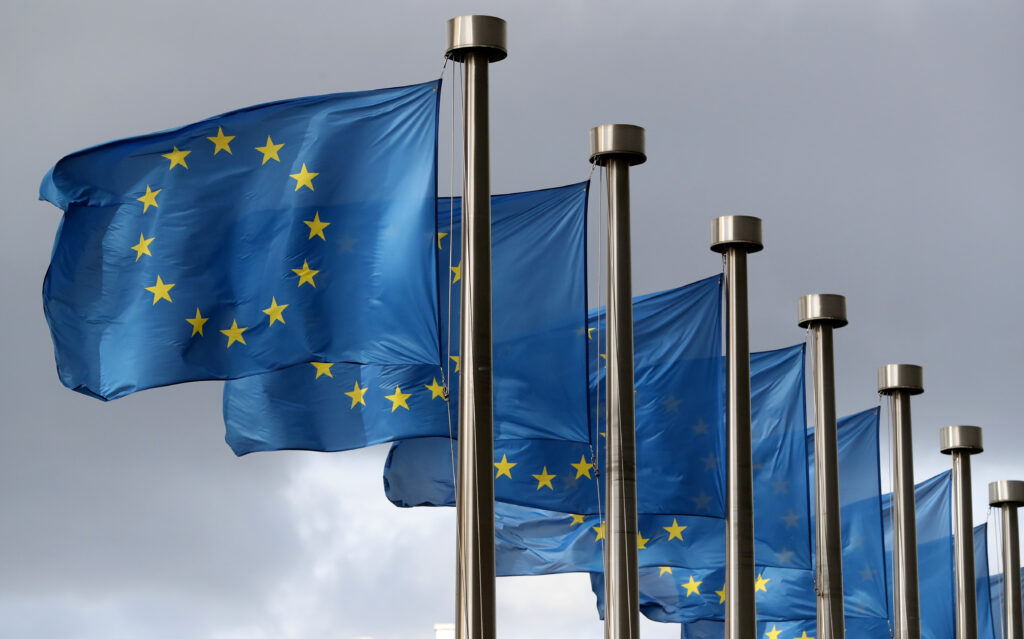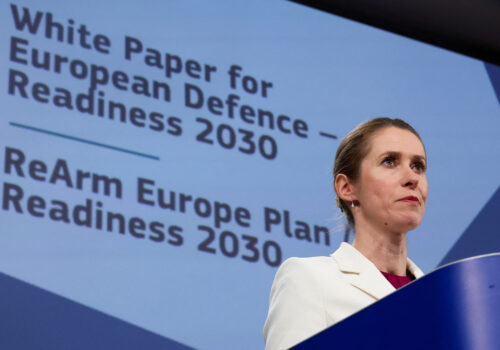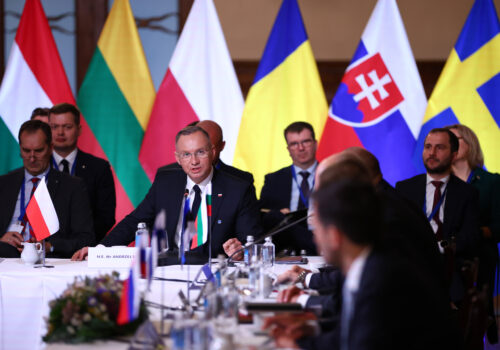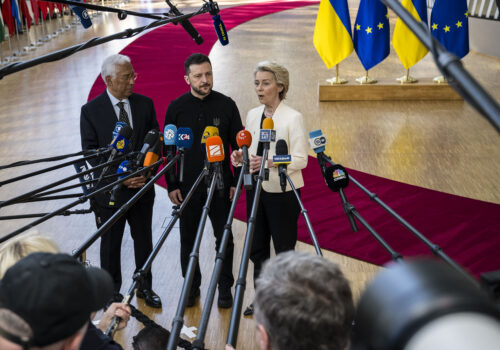A subtle but powerful shift is taking place across Europe. Support for the European Union (EU) is surging, with the latest Eurobarometer survey, published on March 25, showing that 74 percent of citizens of EU member states believe their country has benefited from EU membership. This is the highest level of support for that belief since the question was first asked in 1983.
The “rally ‘round the flag” effect—a surge in public support for a government in times of international crisis—is a well-documented phenomenon in politics. In an increasingly unpredictable world, Europeans are now rallying around the EU flag in Brussels. This growing confidence in the EU as a political and economic actor matters—not just for Europeans, but also for Americans, who should recognize that Europeans have started to prepare for a world in which the United States is no longer a central part of the continent’s security.
The message from Europeans is clear: They still want allies. But at the same time, they are getting ready to stand on their own feet in an uncertain world.
Sweden offers a striking example. Historically, Sweden is a transatlantic-leaning country with deep cultural and political ties to the United States. And it has often maintained a cautious stance toward EU integration. Yet in this latest poll, 79 percent of Swedes say that EU membership has been good for the country. At the same time, a separate survey conducted the same month by Sweden’s largest newspaper, Dagens Nyheter, shows a dramatic shift in Swedish public opinion toward the United States. Only 10 percent of Swedes hold a positive view of the United States, down from 23 percent just two years ago. The shift correlates with US President Donald Trump’s return to office in January. A full 86 percent of Swedes express a negative opinion of him. This dislike is not just personal; Trump is seen as a symbol of a declining US commitment to democratic norms and multilateralism, which many Swedes value highly. A striking two-thirds of Swedes surveyed in the Dagens Nyheter poll say that the United States has lost its role as leader of the free world. This sentiment had already taken root before Trump’s April 2 announcement of major global tariffs, which included a 20 percent tariff on the EU.
Across Europe, 66 percent of respondents in the Eurobarometer poll say that the EU should play a stronger role in protecting citizens from global crises and security threats. Three out of four respondents want the EU to be equipped with more tools, financial or institutional, to tackle these challenges. That said, this surge in pro-EU sentiment is not uniform. In countries led by more Trump-friendly or Euroskeptic governments, such as Hungary and Slovakia, support for deeper EU integration remains more tempered. Yet even in these contexts, the broader shift is visible. In Hungary, where Prime Minister Viktor Orbán has long been critical of Brussels, an April 2024 Eurobarometer survey found that more than two thirds of Hungarians view EU membership as beneficial, marking an increase from previous years. In Slovakia, public frustration with Prime Minister Robert Fico’s pro-Russian stance has sparked mass demonstrations in the past few months, with tens of thousands protesting under the slogan “Slovakia is Europe” expressing their support for democratic values and closer ties to the EU and NATO. These developments suggest that even where political leadership leans Euroskeptic, citizens are increasingly looking to the EU to safeguard their security and sovereignty.
Europeans have started to prepare for a world in which the United States is no longer a central part of the continent’s security.
The EU has responded in unprecedented ways to the call from its citizens to step up on defense and security. In January, European Commissioner for Defense and Space Andrius Kubilius called for a “Big Bang” in European defense spending and policy changes to face the Russian threat. This was an uphill task, with frugal nations such as Sweden, Germany, and the Netherlands opposing initiatives to take out loans and raise debt ceilings, while other nations refused to make commitments to increase defense spending.
But with the push provided by the Trump administration’s clear signaling in recent weeks that Europe will become less of a US security priority, Kubilius got his wish. The ReArm Europe/Readiness 2030 program, presented by the European Commission on March 18, outlines a new era in European security. It should not be understood merely as a short-term reaction to the Trump administration, but a necessary response to a changing global order—one in which the United States pivots to the Indo-Pacific while Europeans can no longer fully rely on US protection to counter the existential threat posed by Russia. As Kubilius put it in a speech on March 20: “450 million Europeans should not ask 340 million Americans to defend us from 140 million Russians who can’t even defeat 38 million Ukrainians.”
The ReArm Europe/Readiness 2030 program marks a historic shift in EU defense policy, mobilizing up to €800 billion through a mix of new and adapted financial instruments. What sets this initiative apart is not just its ambition but how the funding is being unlocked. For the first time, the EU’s Stability and Growth Pact has been loosened to allow member states to undertake defense-related borrowing beyond national debt limits via the escape clause. The initiative also launched a new €150 billion joint-borrowing mechanism, comparable in scale to the EU’s COVID-19 pandemic recovery fund, to support collective procurement and help ramp up the defense industry, including cooperation with Ukraine.
In another radical departure from past practice, the European Investment Bank, which was previously prohibited from military financing, can now fund defense industries. These steps would have been politically impossible just a short while ago. Even Sweden, which has long been resistant to debt-financed EU initiatives, and other traditionally frugal countries are now prepared to take on loans to fund defense modernization. For example, Germany’s recent €100 billion national rearmament plan reflects a sea change in Berlin’s approach to military spending. These developments underscore that Europe is not merely responding to US disengagement but is building real capacity to act.
The tendency for the EU to integrate during crises is not new. For instance, the COVID-19 pandemic resulted in the pan-European procurement of vaccines and the first issuance of an EU eurobond. Still, it is remarkable that no EU government outright blocked the path toward greater defense integration, as far-right parties that are sympathetic to Trump hold power in Hungary, Italy, Slovakia, and the Netherlands. To be sure, European unity on defense is neither unanimous nor uncontested. Some governments remain wary of surrendering sovereignty over defense policy, and debates over funding mechanisms and the scope of joint procurement highlight enduring divisions among member states. These reservations underscore that while the trend is significant, it remains fragile and a range of questions on the implementation of further defense integration remain unsolved. Even so, this is a moment the United States should watch closely. The renewed push for a European Defense Union is a strategic counterweight to the uncertainty coming from Washington. Rather than retreating into nationalism or disengagement, Europeans are choosing to strengthen the EU as a geopolitical actor.
Anna Wieslander, PhD, is director for Northern Europe and head of the Atlantic Council Northern Europe Office in Stockholm.
Louise Blomqvist is a project assistant at the Northern Europe Office.
Further reading
Tue, Apr 1, 2025
The EU just released a roadmap to defend Europe. Will member states follow it?
New Atlanticist By Petr Tůma
To implement the European Commission’s defense readiness report, EU member states must make significant financial commitments and navigate the bloc’s political divisions.
Thu, Mar 20, 2025
As the US steps back in Europe, Central Europe must step up
New Atlanticist By Sona Muzikarova
The West’s security architecture is being redrawn. The question is whether it will be drawn by European powers or for them.
Thu, Mar 6, 2025
How European leaders are responding to Trump’s approach to Ukraine and Europe
New Atlanticist By
From London and Berlin to Paris and Brussels, European leaders have taken several notable steps this week on security. This follows the blow-up between the Ukrainian and US presidents on February 28.
Image: EU flags flutter in front of the European Commission headquarters in Brussels, Belgium October 2, 2019. REUTERS/Yves Herman.




